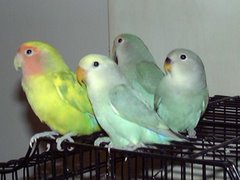Fischer’s Lovebirds
Fischer's lovebirds are more sociable and tolerant than the Masked and better behaved with other birds
Description
Fischer’s Lovebirds body plumage is mainly green, darker on the back, wings and tail, lighter and more yellowish on the under parts.
The forehead, face and throat are orange-red; the collar and upper breast are yellow to yellow-orange. The under wing converts are blue-green; the rump and upper tail coverts are blue. The tail is green with some yellow in the laterals, and sub terminal black and terminal blue bands. The eye-ring is white. The bill is red, the legs and feet grey. The sexes are alike.
Mutations
Reports have come from California of a blue Fischer's. It is said to have sky blue plumages and a White-Grey head. Yellow Fischer's are rare; they are genetically recessive.
Range
The Fischer’s Lovebird is native of northern
Status
They are usually inhabitant of clumps of trees surrounded by grassy plains and isolated shrubs. They were first bred in the
Avicultural rating
A popular and widely-kept aviculturist subject, they are hardy and easily managed and free breeders.
Social Behavior
The male Fischer's Lovebirds have a tendency to pluck chicks in the nest. In the wild condition, we can appreciate a large colony of birds especially while feeding in the crop fields.
The Fischer’s lovebirds are widely accepted through out the world for rearing inside the home. Take care to acquire good, thorough bred specimens with clear, bright colors.







 Free Ads For Bloggers
Free Ads For Bloggers


1 comment:
Hello
I own some fisher mutations : blue,mauve,cobalt,spangle and lutino my favorite.
Post a Comment